What Are The Best Treatments For Dandruff? | Expert Guide
Did you know that dandruff affects nearly 50% of the world’s population? This common scalp condition, characterized by flaky skin and persistent itching, can be a frustrating and embarrassing problem for many individuals. But the good news is that there are a range of Effective treatments available, from over-the-counter shampoos to prescription medications and even Natural remedies.
In this comprehensive Guide, we’ll explore the different Treatment options for dandruff, from understanding the causes and symptoms to identifying the most Effective active ingredients and when to seek professional help. Whether you’re dealing with a mild case of flakiness or a more severe case of seborrheic dermatitis, this Expert-backed information will help you find the right solution for your unique needs.
Key Takeaways
- Dandruff affects nearly 50% of the world’s population.
- Effective over-the-counter treatments contain active ingredients like pyrithione zinc, salicylic acid, and ketoconazole.
- Prescription options are available for severe cases, such as those involving seborrheic dermatitis or psoriasis.
- Natural remedies like tea tree oil, aloe vera, and probiotic ferments can also help reduce dandruff symptoms.
- Maintaining a healthy scalp through proper hair care and addressing underlying skin conditions is key to long-term dandruff management.
Understanding Dandruff: Causes and Symptoms
Dandruff is a common scalp condition that affects a significant portion of the global adult population, with estimates suggesting that around half of all adults experience this issue. While dandruff can be a nuisance, understanding its causes and symptoms is crucial for effective management.
Common Causes of Dandruff
Dandruff can be triggered by various factors, including oily skin, certain medical conditions, and even hair care routines. Research indicates that males tend to have dandruff more often than females, and individuals with oily hair or specific illnesses like Parkinson’s disease, HIV, or other conditions that affect the immune system, have a higher risk of developing dandruff.
Identifying Symptoms of Dandruff
The primary symptoms of dandruff include the presence of white, oily flakes on the scalp and shoulders, accompanied by itching and sometimes redness. In more severe cases, known as seborrheic dermatitis, individuals may experience oily, red, and scaly patches on the scalp and other areas of the body, such as the face and eyebrows. Additionally, dandruff can lead to hair loss and dry flakes on the skin of the face.
Regular exposure to the outdoors and fresher air can help reduce oil buildup on the scalp, potentially alleviating dandruff. However, for more persistent or severe cases, understanding the underlying causes and seeking appropriate Treatment is essential for managing this common scalp condition.
| Dandruff Causes | Dandruff Symptoms |
|---|---|
|
|
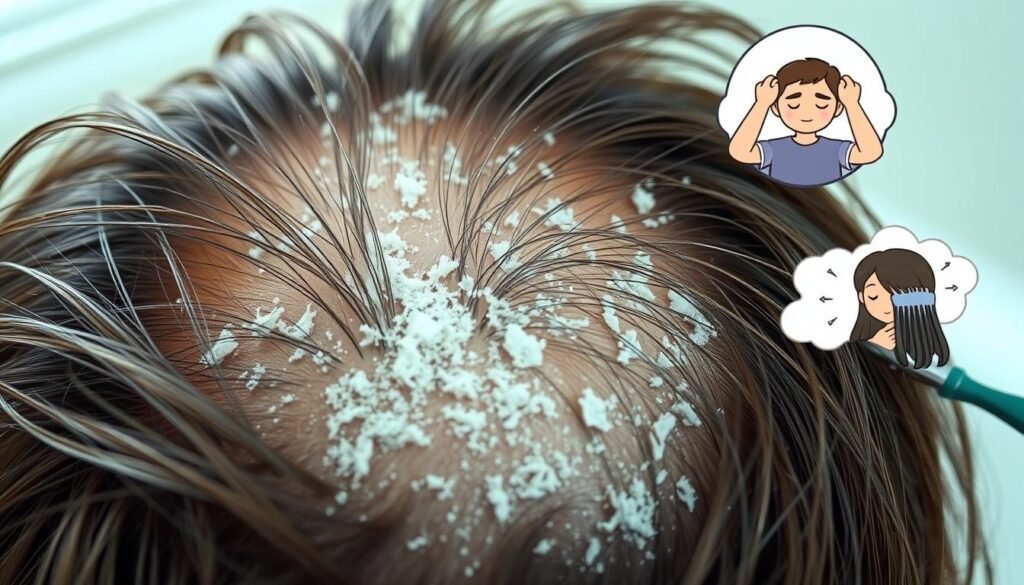
By understanding the common causes and identifying the symptoms of dandruff, individuals can take proactive steps to address this scalp condition and maintain a healthy, flake-free scalp.
Over-the-Counter Treatments for Dandruff
When it comes to managing dandruff, over-the-counter (OTC) treatments can be an effective first line of defense. These anti-dandruff shampoos contain various active ingredients that target the underlying causes of this common scalp condition.
Effective Active Ingredients in Shampoos
The most commonly used active ingredients in OTC dandruff shampoos include:
- Pyrithione zinc – Known for its antibacterial and antifungal properties, this ingredient is found in popular brands like Head & Shoulders.
- Salicylic acid – This chemical exfoliant helps eliminate flaky, scaly buildup on the scalp.
- Selenium sulfide – An antifungal agent found in shampoos like Selsun Blue.
- Ketoconazole – Targets the fungus that can cause dandruff, as seen in Nizoral shampoos.
- Coal tar – This ingredient in Neutrogena T/Gel shampoo helps slow down skin cell turnover.
How to choose the Right Product
When selecting an OTC dandruff shampoo, consider the severity of your condition and your hair type. For mild cases, a shampoo containing pyrithione zinc or salicylic acid may be sufficient. For more stubborn dandruff, products with selenium sulfide or ketoconazole may be more effective. It’s often recommended to alternate between different dandruff shampoos to prevent your scalp from becoming resistant to a single active ingredient.
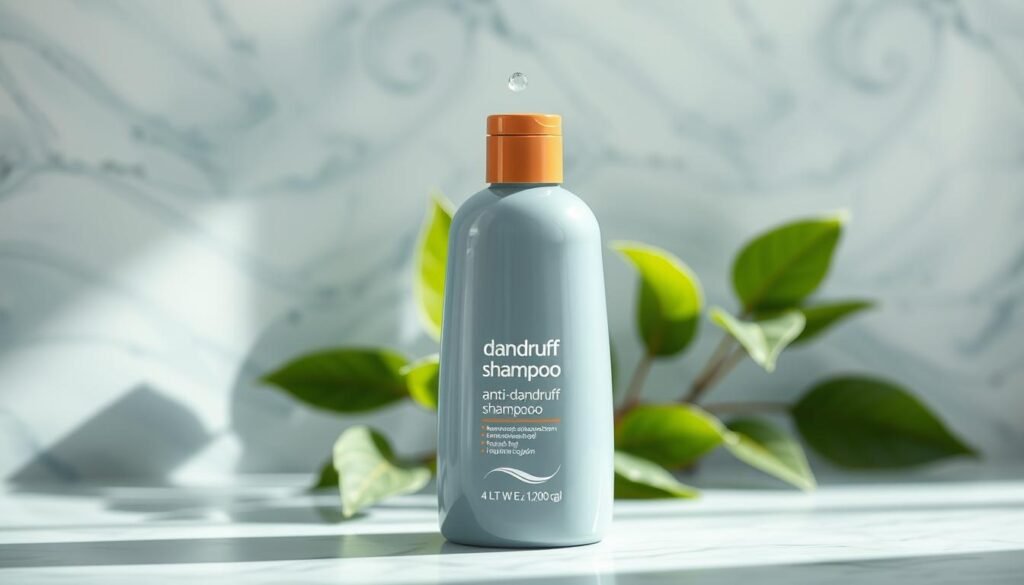
Remember to massage the shampoo into your scalp and let it sit for a few minutes before rinsing to ensure the active ingredients have time to work. With the right anti-dandruff solutions, you can effectively manage your scalp care and keep those pesky flakes at bay.
Prescription Treatments for Severe Dandruff
While over-the-counter dandruff shampoos can effectively manage mild to moderate cases, some individuals may require prescription-strength treatments for severe or persistent dandruff. These prescription options are typically recommended when the condition does not respond well to commercial anti-dandruff solutions.
When to Seek Professional Help
If your dandruff is accompanied by persistent itching, redness, scaling, or does not improve with regular use of over-the-counter products, it may be time to consult a dermatologist. They can assess the severity of your condition and determine the most appropriate treatment plan.
Common Prescription Options
- Prescription-strength anti-dandruff shampoos: These contain higher concentrations of active ingredients like zinc pyrithione, selenium sulfide, or ketoconazole to better control the severe dandruff treatment.
- Corticosteroid lotions: Medications like fluocinolone (Capex) can help reduce inflammation and itching associated with severe dandruff.
- Calcineurin inhibitors: Drugs such as pimecrolimus (Elidel) and tacrolimus (Protopic) work by suppressing the immune response that contributes to prescription anti-dandruff solutions.
- Phototherapy: In some cases, controlled exposure to ultraviolet (UV) light may be recommended to help manage stubborn dandruff.
The choice of prescription treatment will depend on the underlying cause of your dandruff, as well as the severity of your symptoms. Your dermatologist will work with you to determine the most effective severe dandruff treatment and prescription anti-dandruff solutions for your unique situation.
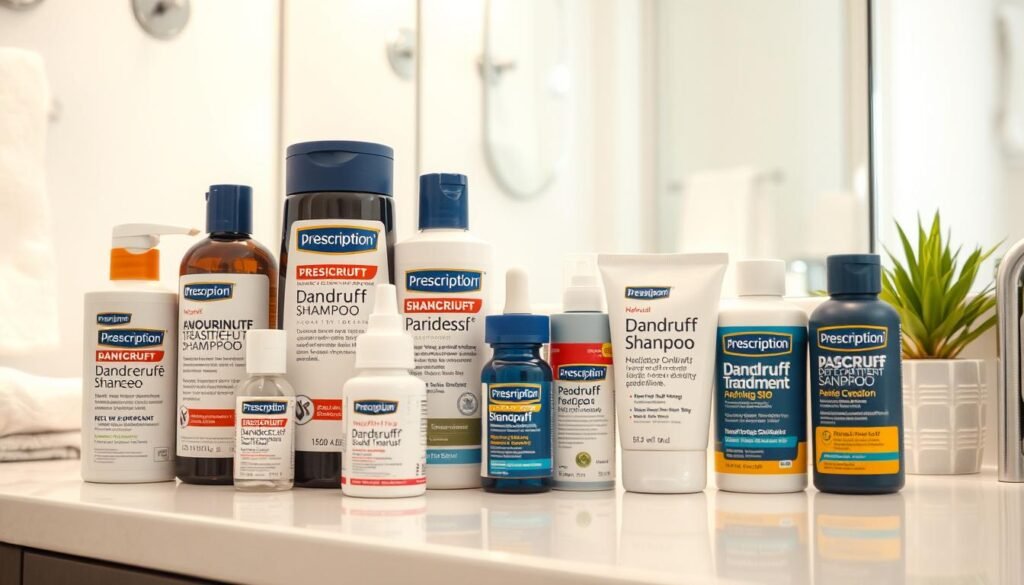
Home Remedies for Dandruff
If you’re looking for natural ways to manage dandruff, there are several home remedies worth trying. These DIY dandruff treatments can be an effective and affordable way to address the issue without harsh chemicals.
Natural Ingredients to Try
Some natural ingredients that may help reduce dandruff include:
- Coconut oil – With its antifungal properties, coconut oil can help moisturize the scalp and combat the yeast that causes dandruff.
- Aloe vera – Aloe vera has soothing and anti-inflammatory effects that may be beneficial for conditions like seborrheic dermatitis, a common cause of dandruff.
- Apple cider vinegar – The acidic nature of apple cider vinegar may help balance the scalp’s pH and inhibit the growth of dandruff-causing fungi.
- Aspirin – Aspirin contains salicylic acid, which can help reduce inflammation and remove built-up skin cells on the scalp.
- Baking soda – As a gentle exfoliant, baking soda can help remove dandruff flakes and excess oil from the scalp.
DIY Dandruff Treatments
In addition to using individual ingredients, you can also try some simple DIY dandruff treatments:
- Create a scalp scrub by mixing baking soda and water, then massage it into your scalp before shampooing.
- Make a hair mask by combining coconut oil, lemon juice, and honey, and leaving it on your scalp for 20-30 minutes before rinsing.
- Mix apple cider vinegar with water in a spray bottle and spritz it onto your scalp, letting it sit for a few minutes before rinsing.
While these natural remedies for dandruff may be helpful, it’s important to note that the scientific evidence for their effectiveness is limited. They may not work for everyone, and severe or persistent dandruff may require more targeted treatment. If home remedies don’t provide relief, it’s best to consult a dermatologist for professional advice.
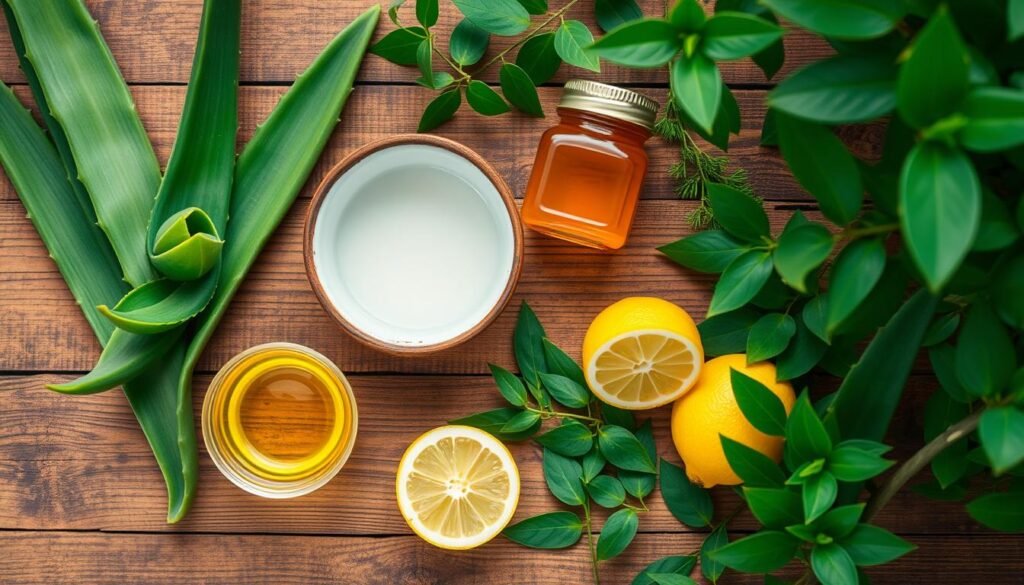
Lifestyle Changes to Reduce Dandruff
Battling persistent dandruff requires more than just using the right shampoo. Incorporating simple lifestyle adjustments can make a significant difference in maintaining a healthy, flake-free scalp. From diet and nutrition to regular hair care, these strategies can help prevent dandruff and promote scalp well-being.
Diet and Nutrition Tips
A balanced diet rich in key nutrients can go a long way in reducing dandruff. Incorporate the following foods into your meals:
- Foods high in zinc, such as oysters, red meat, and poultry, as zinc deficiency has been linked to seborrheic dermatitis and dandruff.
- Foods containing omega-3 fatty acids, like salmon, walnuts, and chia seeds, to help manage oil production, hydration, and inflammation on the scalp.
- Probiotic-rich foods, such as yogurt, kefir, and sauerkraut, which may aid in reducing dandruff severity according to research.
Importance of Regular Hair Care
Establishing a consistent hair hygiene routine can make a significant difference in managing dandruff. Consider the following tips:
- Wash your hair regularly, adjusting frequency based on your scalp type (daily for oily scalps, less often for dry scalps).
- Limit the use of styling products, as excessive buildup can contribute to dandruff.
- Protect your scalp from excessive sun exposure, which can exacerbate dryness and irritation.
By implementing these lifestyle changes, you can take proactive steps to care for your scalp and reduce the occurrence of pesky dandruff flakes.

“Regular hair and scalp hygiene, protecting the scalp from UV rays, limiting triggers, reducing stress levels, and avoiding scratching the scalp can help prevent dandruff.”
The Role of Stress in Dandruff
While stress may not directly cause dandruff, it can significantly exacerbate the condition. Stress can weaken the immune system and trigger hormonal changes, creating an ideal environment for the growth of the dandruff-causing microbe, Malassezia Globosa. Symptoms of stress, such as overheating and increased sweating, can further contribute to the problem by providing more oil for the fungus to feed on, leading to increased flaking and itching.
How Stress Affects Scalp Health
Stress-related hormonal changes can increase sebum production, leading to a buildup of oils on the scalp. This oily environment allows the Malassezia Globosa fungus to thrive, causing the characteristic white, flaky dandruff to appear. Additionally, the act of scratching the head during stressful moments can transfer dirt and oils from the hands to the scalp, further worsening the issue.
Stress Management Techniques
- Meditation and deep breathing exercises
- Regular physical activity, such as walking or yoga
- Journaling and listening to relaxing music
- Ensuring adequate sleep and avoiding caffeine
- Incorporating stress-reducing essential oils into your hair care routine
- Minimizing social media exposure and fostering meaningful social connections
By implementing these stress management techniques, you can help reduce the severity of dandruff and maintain a healthier scalp. Remember, addressing the underlying stress factors is just as important as using effective anti-dandruff shampoos, like Head & Shoulders, to combat the visible symptoms of this common scalp condition.
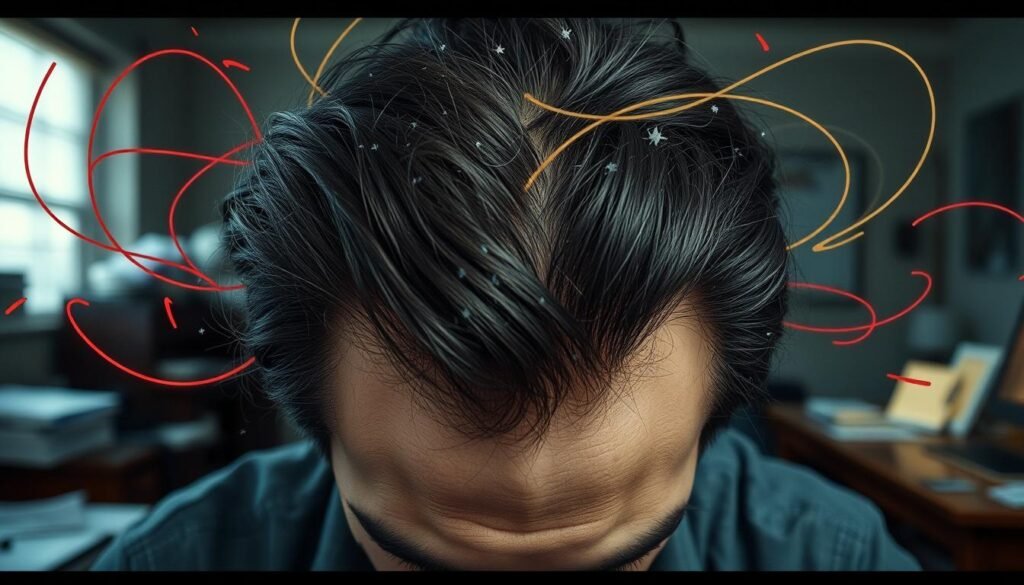
Scalp Conditions and Their Relation to Dandruff
Dandruff is often a mild form of a more severe scalp condition known as seborrheic dermatitis. This chronic inflammatory skin disorder can cause oily, red, and scaly patches on the scalp. Psoriasis, another common scalp condition, can also lead to flaking and may be mistaken for dandruff by some individuals.
Seborrheic Dermatitis
Seborrheic dermatitis (SD) is a prevalent skin condition that affects up to 3% of the general adult population, with men experiencing it more frequently than women. It is characterized by greasy, white or yellowish scales as well as inflamed, red skin and intense itchiness. According to the American Academy of Dermatology, individuals with oily skin, hair, acne, or psoriasis are more prone to developing seborrheic dermatitis.
Psoriasis and Its Impact
Psoriasis is a chronic, autoimmune condition that can also manifest on the scalp. This disorder is marked by the rapid production of new skin cells, leading to the formation of thick, crusted scales that can be itchy and sore. While psoriasis is often mistaken for dandruff, it is a distinct condition that requires specialized treatment.
Understanding the relationship between dandruff and these more severe scalp conditions is crucial for proper diagnosis and effective treatment. If you suspect you may have a scalp condition beyond simple dandruff, it is recommended to consult a dermatologist for a professional assessment and personalized care plan.
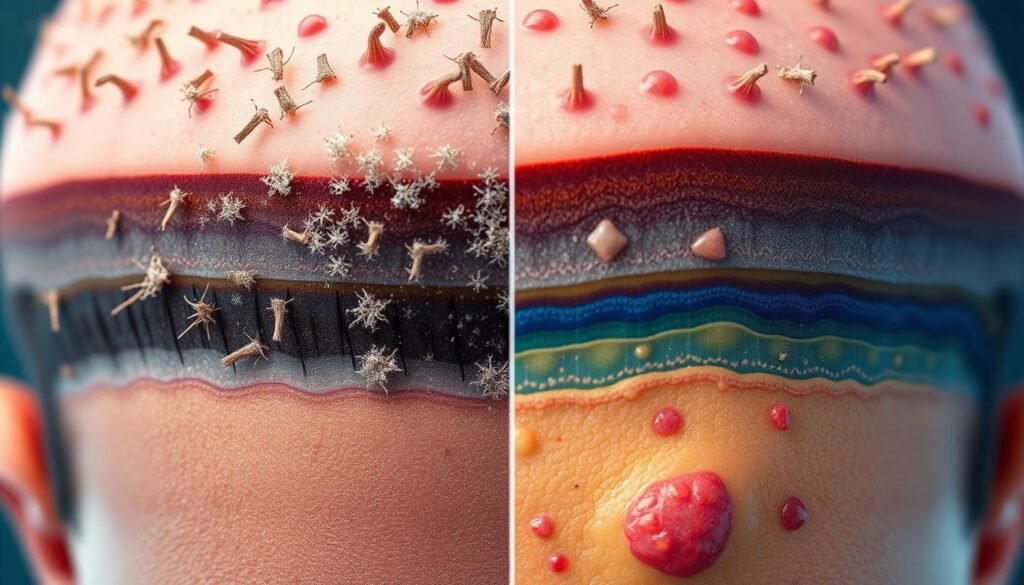
“Seborrheic dermatitis and dandruff combined affect half of the adult population, and in infants up to three months of age, the incidence can be as high as 42%.”
| Scalp Condition | Prevalence | Key Characteristics |
|---|---|---|
| Seborrheic Dermatitis | 1-3% of general adult population | Greasy, white/yellowish scales, inflamed red skin, intense itchiness |
| Psoriasis | Affects up to 3% of the population | Thick, crusted scales, can be itchy and sore |
| Dandruff | Affects 50 million Americans | Flaky skin on the scalp and in the hair |
The Importance of a Healthy Scalp
Maintaining a healthy scalp is crucial for preventing and managing common hair and scalp issues, including dandruff. Your scalp is the foundation for healthy hair growth, and neglecting its care can lead to a variety of problems. By prioritizing scalp health, you can promote better hair hygiene, minimize irritation, and support the overall well-being of your tresses.
Tips for Maintaining Scalp Health
To keep your scalp in optimal condition, consider the following tips:
- Cleanse your scalp regularly: Aim to wash your hair at least once a week to remove excess oil, dirt, and skin cell buildup that can contribute to scalp issues.
- Gently massage your scalp: During shampooing, use your fingertips to gently massage your scalp in circular motions. This can help loosen flakes and improve blood circulation.
- Rinse thoroughly: Ensure that you rinse all shampoo residue from your scalp to prevent dryness and irritation.
- Avoid excessive scratching: Scratching your scalp can cause irritation and worsen existing conditions like dandruff.
- Use lukewarm water: Hot water can strip your scalp of natural oils, leading to dryness and discomfort.
Scalp Hygiene Best Practices
In addition to the tips above, consider the following best practices for maintaining a healthy scalp:
- Avoid leaving your hair wet for extended periods, as this can create an environment for bacterial growth.
- Opt for oil-free scalp products to prevent exacerbating issues like inflammation, itchiness, and flaking.
- Regularly massage your scalp to improve blood circulation and support hair growth.
- Stay hydrated by drinking at least four to six cups of water per day to maintain scalp moisture and skin elasticity.
By incorporating these scalp care, hair hygiene tips, and healthy scalp maintenance practices into your routine, you can help promote a thriving, balanced scalp and enjoy healthier, more vibrant hair.
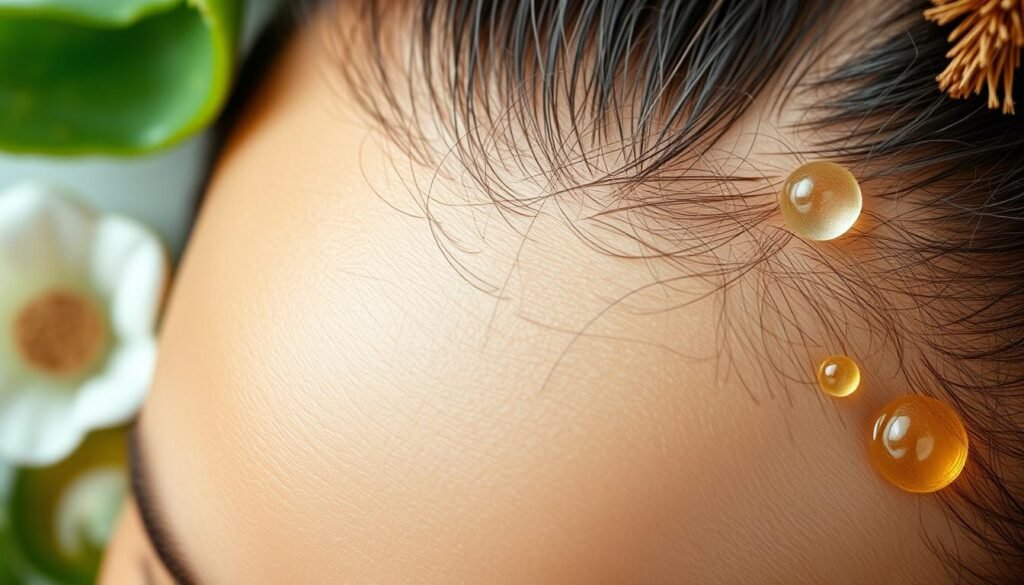
Proper scalp care is essential for the overall health and appearance of your hair. By addressing the root causes of scalp-related issues, you can achieve a more vibrant, nourished, and resilient scalp.
When to Consult a Dermatologist
Dealing with persistent dandruff can be frustrating, but knowing when to seek professional help is crucial. If over-the-counter treatments haven’t improved your condition after several weeks, or if you experience severe itching, redness, or pain on your scalp, it’s time to consult a dermatologist.
Signs That Indicate a Need for Professional Advice
- Over-the-counter dandruff treatments have not provided relief after consistent use for several weeks.
- Your scalp is experiencing severe itching, redness, or pain that doesn’t improve with home remedies.
- You have a history of chronic scalp conditions, such as seborrheic dermatitis or psoriasis.
- You’re unsure about the underlying cause of your dandruff and need a proper diagnosis.
What to Expect During Your Consultation
During your dermatologist consultation, the specialist will thoroughly examine your scalp to determine the root cause of your dandruff. They may take a small sample of your skin for testing to rule out any underlying skin conditions. Based on the findings, the dermatologist may prescribe stronger medicated shampoos, topical treatments, or even oral medications to effectively manage your severe dandruff treatment.
Be prepared to discuss your current hair care routine, any products you’ve been using, and any changes in your lifestyle or stress levels that may be contributing to your dermatologist consultation. This information will help the dermatologist develop a personalized treatment plan to address the underlying issue and provide long-term relief.
“Seeking professional help for persistent or severe dandruff is crucial to ensure proper diagnosis and effective treatment. Don’t hesitate to consult a dermatologist if over-the-counter options don’t provide the relief you need.”

Myths and Misconceptions About Dandruff
Dandruff is a common scalp condition that affects nearly 50% of the adult population. Yet, there are many myths and misconceptions surrounding this frustrating issue. It’s time to separate fact from fiction and understand the truth about dandruff.
Common Myths Debunked
Contrary to popular belief, dandruff is not caused by poor hygiene alone. It’s also not a contagious condition. While oily skin can contribute to dandruff, dry skin is not the sole culprit either. Stress may exacerbate dandruff, but it’s not the direct cause. Additionally, hot water doesn’t create dandruff; it can actually dry out the scalp, making the problem worse.
Understanding the Truth about Dandruff
- Dandruff is linked to an overgrowth of a specific fungus, Malassezia, on the scalp.
- Factors like genetics, diet, climate, and stress levels can influence the development of dandruff.
- Dandruff is different from dry scalp, which presents smaller, drier flakes.
- Not all shampoos are effective in treating dandruff; specialized products like the Advanced Oil Control Trio have shown better results.
- DIY remedies may not always be the most effective solution for managing persistent dandruff.
- Exfoliating the scalp can be beneficial in addressing dandruff, but it’s not a cure-all.
- Contrary to belief, dandruff does not directly cause hair loss.
By understanding these facts, you can take the necessary steps to effectively manage and treat your dandruff, leading to a healthier, more confident scalp.
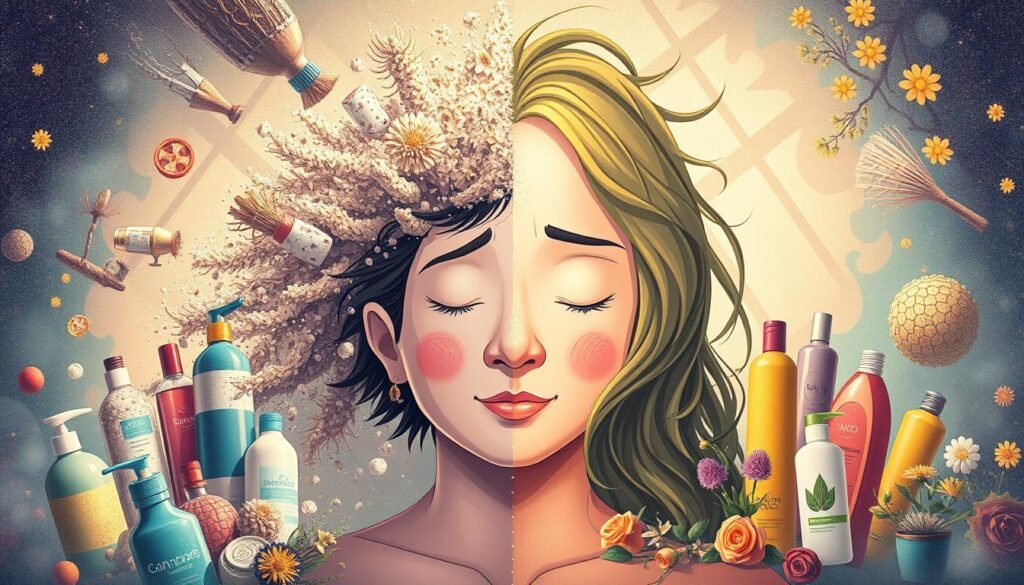
Long-Term Management of Dandruff
Conquering dandruff is an ongoing journey that requires a sustainable hair care routine. While over-the-counter treatments and home remedies can effectively manage the condition, maintaining long-term control often necessitates a more comprehensive approach.
Creating a Sustainable Hair Care Routine
The key to lasting dandruff relief lies in incorporating anti-dandruff shampoos into your regular hair care regimen, even after the initial symptoms have subsided. Experts suggest rotating between different shampoos containing active ingredients like pyrithione zinc, selenium sulfide, or ketoconazole to prevent your scalp from becoming resistant to any single product.
Monitoring Triggers and Adjusting Treatments
Dandruff can be influenced by a variety of factors, from stress and diet to changes in hair products. Pay close attention to your scalp and adjust your treatment plan accordingly. If one shampoo loses its effectiveness over time, consider switching to a different formulation to maintain control of the condition.
Additionally, lifestyle factors such as managing stress, ensuring a balanced diet, and following proper scalp hygiene can contribute to long-term dandruff management, hair care routine, and overall scalp care. By being proactive and responsive to your scalp’s needs, you can effectively maintain a healthy, dandruff-free head of hair.
“The itching and flaking of dandruff can almost always be controlled.”

Conclusion: Finding the Right Treatment for You
Finding the right treatment for your dandruff may require some trial and experimentation, but with the wealth of information and solutions available, you’re sure to find a path to a healthy, flake-free scalp. Stay informed about the latest anti-dandruff products and treatment options, and don’t hesitate to seek personalized advice from the experts at HairMD or a qualified dermatologist.
Staying Informed About Dandruff Solutions
As new research and innovative treatments emerge, it’s essential to stay up-to-date on the evolving landscape of dandruff management. Regularly check trusted sources, such as medical journals and reputable health websites, to learn about the latest advancements in scalp care and anti-dandruff solutions. This knowledge can empower you to make informed decisions and select the most effective treatments for your specific needs.
Encouragement to Seek Help If Needed
Remember, dandruff is a common condition that can often be effectively managed with the right approach. However, if your dandruff persists or worsens despite your efforts, don’t hesitate to consult a dermatologist. These experts can provide a comprehensive assessment, identify any underlying causes, and recommend the most suitable treatment plan tailored to your individual needs. With their guidance and the right combination of scalp care, suitable treatments, and lifestyle adjustments, you can achieve long-term relief from the symptoms of dandruff.
FAQ
what are the main causes of dandruff?
Dandruff can be caused by various factors, including oily skin, certain medical conditions, and hair care routines. Symptoms include white flakes on the scalp and shoulders, itching, and sometimes redness.
what are the effective ingredients in over-the-counter dandruff shampoos?
Common active ingredients in dandruff shampoos include pyrithione zinc, salicylic acid, selenium sulfide, ketoconazole, and coal tar. These ingredients have antibacterial, antifungal, and skin-shedding properties to help manage dandruff.
When should I see a dermatologist for dandruff?
You should consult a dermatologist if over-the-counter treatments don’t improve your dandruff after several weeks, or if you experience severe itching, redness, or pain. The dermatologist can provide a proper diagnosis and prescribe stronger medications if necessary.
Can home remedies help manage dandruff?
Yes, some home remedies like coconut oil, aloe vera, apple cider vinegar, and tea tree oil may help manage dandruff. However, the evidence for their effectiveness is limited, and they may not work for everyone.
How can lifestyle changes help reduce dandruff?
Lifestyle changes that can help reduce dandruff include maintaining a healthy diet rich in zinc, B vitamins, and healthy fats, establishing a suitable hair care routine, and managing stress through techniques like meditation and regular physical activity.
Is dandruff contagious?
No, dandruff is not a contagious condition. It’s a common scalp condition that can be effectively managed with the right treatment approach.
How can I maintain a healthy scalp to prevent and manage dandruff?
Maintaining a healthy scalp involves regular cleansing, gentle massaging during washing, proper rinsing, and avoiding excessive scratching or use of hot water. These practices can help remove excess oil and skin cell buildup, which can contribute to dandruff.






